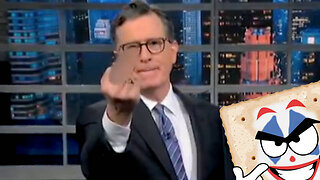Premium Only Content

Lies, Lies, Lies Top CIA, FBI, DOJ Officials Grilled Abuse Section 702’s Mass Surveillance
Arrests Along U.S.-Mexico Border Top 2 million a year for the first time Federal authorities are on pace to make more than 2.3 million arrests during the 2022 fiscal year, which ends Sept. 30. That will far exceed last year’s record of more than 1.7 million arrests. The law, Section 1325 of Title 8 of the U.S. Code, makes entering the United States “at any time or place other than as designated by immigration officers” a federal crime. Total U.S.-Mexico border for last 50 years is 46 million+ people and got-a-ways not counted Why the hell should we trust anything they say unless they do what’s right for Lies, Lies, Lies To The People Of American Again, I never would’ve thought my home would have to deal with so many corrupt people, dishonest, disgusting people should be removed from their posts, there is some small piece of mind knowing and seeing true American patriots fight this extremely hard fight. The Senate Judiciary Committee holds a hearing on Section 702 of the Foreign Intelligence Surveillance Acts.
https://explore.dot.gov/views/BorderCrossingData/Annual?%3Aembed=y&%3AisGuestRedirectFromVizportal=y
U.S. authorities made more than 2 million immigration arrests along the southern border during the past 11 months, marking the first time annual enforcement statistics have exceeded that threshold, according to figures provided by senior Biden administration officials Monday.
In August, U.S. Customs and Border Protection detained 203,598 migrants crossing from Mexico, the latest figures show, putting authorities on pace to tally more than 2.3 million arrests during the government’s 2022 fiscal year, which ends Sept. 30. The total, which includes some people apprehended more than once, far exceeds last year’s record of more than 1.7 million arrests.
The historic migration wave this year has been driven by soaring numbers of people crossing from outside Mexico and Central America, the two largest traditional sources of illegal entries. Migrants from Venezuela, Nicaragua and Cuba accounted for more than one-third of those taken into custody along the southern border last month, according to Customs and Border Protection, a 175% increase over August 2021.
10 Years Later What Are We Still Fighting For?
Gutting or Ending Section 702 In Fall 2023, Congress will get a chance to seriously reform or end Section 702 of FISA in light of its impending sunset. Section 702 allows the government to conduct surveillance inside the United States by vacuuming up digital communications so long as the surveillance is directed at foreigners currently located outside of the United States. It also prohibits intentionally targeting Americans. Nevertheless, the NSA routinely (“incidentally”) acquires innocent Americans' communications without a probable cause warrant. Once collected, the FBI can search through this massive database of information by “querying” the communications of specific individuals.
In 2021 alone, the FBI conducted up to 3.4 million warrantless searches of Section 702 data to find Americans’ communications. Congress and the FISA Court have imposed modest limitations on these “backdoor searches,” but according to several recent FISA Court opinions, the FBI has engaged in “widespread violations” of even these minimal privacy protections.
The Snowden revelations gave names to two of the key types of surveillance that the NSA conducts under Section 702: Prism and Upstream. Upstream has been central to EFF’s litigation, as we had direct evidence about it long before we knew its name. If 702 ends, both of these two programs should end along with them.
As noted above, any reform of Section 702 should also permanently revoke the now defunct authorization to conduct “about” collection, which was paused by the NSA in 2017 amid civil liberties concerns. These are collections of information not sent to or from a target but are communications “about” or which make reference to a surveillance target.
Fighting Barriers to Standing in Court and the Disclosure of “Secret Evidence”
Since the original passage of FISA in 1978, private parties have been empowered to sue over national security surveillance that violates their rights, including through a mechanism for courts to consider classified evidence while preserving national security. But in lawsuit after lawsuit, the executive branch has sought to avoid these procedures, and the judiciary, including the Supreme Court, has adopted cramped readings of the law that create a de facto national security exception to the Constitution.
The result is that even when the facts of a surveillance program are widely known—as with Upstream surveillance conducted under Section 702—courts too often refuse to find that individuals harmed have standing to sue. That was the case in EFF’s flagship lawsuit, Jewel v. NSA, where the Supreme Court allowed our case to be dismissed because a lower court found common knowledge to be classified. It deemed it a “secret” that the mass spying programs that everyone has known about since at least the Snowden documents came to light in 2013 involved the nation’s two largest telecommunications carriers.
We need Congress to fix this mess by explaining that FISA always meant what it says: that secrecy should not be a complete bar to litigating the constitutionality of mass surveillance, and that courts should not create new justifications to avoid reaching these issues.
EO 12333 Surveillance
Much of the spying that the NSA does overseas is conducted under the auspices of Executive Order 12333. This directly impacts people around the world, but also Americans whose communications can and often are included and then analyzed, including with a tool called XKEYSCORE. As the Guardian reported in 2013 based upon Snowden's revelations, XKEYSCORE gives analysts the power to watch—in real time—anything a person does on the Internet. There are serious issues raised by this tool and by 12333 more broadly. Despite consistent calls for reform, however, very little has occurred and 12333 mass surveillance, using XKEYSCORE and otherwise, appears to continue unabated. The Privacy and Civil Liberties Board (PCLOB), a government agency intended to advise the executive branch on privacy and civil liberties, issued a disappointing report, after much delay, which prompted an appropriately critical response from PCLOB member Travis LeBlanc. We still need to have a serious conversation not only about NSA spying in the U.S. but about it’s much bigger collection and analysis and use with very little oversight, all around the world.
Congress Still Needs to Take Privacy Seriously
Congress’s relationship to privacy comes when it’s politically expedient and disappears as soon as members feel as if they could be too easily painted as being soft on crime or national security. Despite calls over the last few years for federal legislation to reign in big tech companies, we’ve seen nothing significant in limiting tech company's ability to collect data (then accessed by the NSA via Prism), or regulate biometric surveillance, or close the backdoor that allows the government to buy personal information rather than get a warrant, much less create a new Church Committee to investigate the intelligence community’s overreaches. It’s why so many cities and states have had to take it upon themselves to ban face recognition or predictive policing, or pass laws to protect consumer privacy and stop biometric data collection without consent.
It’s been 10 years since the Snowden revelations and Congress needs to wake up and finally pass some legislation that actually protects our privacy, from companies as well as from the NSA directly.
Yet there’s no one simple description of a migrant. Across the U.S. political spectrum, politicians and activists present Central American migrants as either dreamers or law-breakers; those fleeing violence or those abusing immigration loopholes; crying toddlers or MS-13 gangsters. These labels force migrants into rigid categories, losing the diversity of their reasons and their wide-ranging demographics and backgrounds.
To understand Central American migrants means first abandoning the depiction of the “Northern Triangle” of Central America as a homogenous region. All three countries have different histories and contemporary political realities, along with varying security and development indicators that help explain today’s situation. Using the World Bank’s measure, Honduras has the highest levels of poverty, with 30 percent of the population living at US$3.20 a day or less, compared to Guatemala (25 percent), and El Salvador (ten percent). Meanwhile, two thirds of Salvadorans live in cities, compared to 55 percent of Hondurans and closer to 50 percent of Guatemalans. Finally, Guatemala’s authorities report that 40 percent of the population is indigenous, versus closer to 10 percent in Honduras, and an almost non-existent indigenous population in El Salvador (0.2 percent). These factors help explain what moves migrants from each country to travel to the United States.
During the first Democratic presidential debate of the 2020 race, former Housing and Urban Development secretary Julián Castro challenged all candidates to join his call for the repeal of a controversial immigration law.
The law, Section 1325 of Title 8 of the U.S. Code, makes entering the United States “at any time or place other than as designated by immigration officers” a federal crime.
It’s among the most prosecuted federal crimes in the United States. Thousands of defendants are charged with violating Section 1325 each month.
The government shouldn’t “criminalize desperation,” Castro argued. Instead, he advocated, it should treat the unlawful entry of undocumented migrants as “a civil violation.” That is, migrants who enter the United States without permission should be deported, not incarcerated.
Castro acknowledged that several other candidates on the stage in Miami, including Sen. Cory Booker, Washington Gov. Jay Inslee, and Sen. Elizabeth Warren, already agree with him.
But others, like former congressman Beto O’Rourke, don’t support Section 1325’s repeal.
“I don’t think it’s asking too much for people to follow our laws when they come to this country,” O’Rourke said.
During the second night of the debates, which featured a slate of another 10 Democratic hopefuls, most of the candidates on stage indicated their support for the measure’s repeal.
Lies, Lies, Lies Top FISC-DOJ-CIA-FBI Secret Section 702’s Mass Surveillance!
https://en.wikipedia.org/wiki/List_of_FBI_controversies
Lies, Lies, Lies Top FISC-DOJ-CIA-FBI Secret Section 702’s Mass Surveillance!
https://en.wikipedia.org/wiki/List_of_CIA_controversies
Lies, Lies, Lies Top FISC-DOJ-CIA-FBI Secret Section 702’s Mass Surveillance!
https://en.wikipedia.org/wiki/PRISM
Lies, Lies, Lies Top FISC-DOJ-CIA-FBI Secret Section 702’s Mass Surveillance!
https://en.wikipedia.org/wiki/National_Security_Agency
Lies, Lies, Lies Top FISC-DOJ-CIA-FBI Secret Section 702’s Mass Surveillance!
https://en.wikipedia.org/wiki/Central_Intelligence_Agency
Lies, Lies, Lies Top FISC-DOJ-CIA-FBI Secret Section 702’s Mass Surveillance!
https://en.wikipedia.org/wiki/Backdoor_(computing)
Lies, Lies, Lies Top FISC-DOJ-CIA-FBI Secret Section 702’s Mass Surveillance!
https://en.wikipedia.org/wiki/Twitter_Files
How FISC-DOJ-CIA-FBI Secret Courts, Justice System, Government Works
Government Surveillance Security v. Liberty v. Your Privacy Rights v. Body Count! Modern Surveillance Activities by the United States Government have taken place since World War 1 an 2 and continue to this day, especially in the aftermath of the September 11 attacks. Proponents of such efforts argue that un-lawful surveillance is necessary to protect national security and that the FISA-DOJ-CIA-FBI-NSA-DEA court system is designed to prevent abuses. Opponents argue that such surveillance rarely produces actionable intelligence and can be wielded by unaccountable bureaucrats at the expense of targeted individuals and groups.
SURVEILLANCE ACT
Section 702 of the Foreign Intelligence Surveillance Act is a critical tool for protecting our national security. It enables the U.S. Intelligence Community to collect, analyze, and share foreign intelligence information on individual terrorists, weapons proliferators, hackers, and other foreign intelligence targets. Take a deeper look at how we use FISA Section 702, how privacy and civil liberties safeguards are built into our work, and how our use of these tools is overseen by all three branches of government.
https://www.intelligence.gov/foreign-intelligence-surveillance-act
In 2008, Congress enacted Section 702 of the Foreign Intelligence Surveillance Act (FISA), a critical intelligence collection authority that enables the Intelligence Community (IC) to collect, analyze, and appropriately share foreign intelligence information about national security threats. Section 702 authorizes targeted intelligence collection of specific types of foreign intelligence information—such as information concerning international terrorism or the acquisition of weapons of mass destruction—identified by the Attorney General and the Director of National Intelligence (DNI).
Section 702 only permits the targeting of non-United States persons who are reasonably believed to be located outside the United States. United States persons and anyone in the United States may not be targeted under Section 702. Section 702 also prohibits “reverse targeting”—the IC may not target a non-U.S. person located outside the U.S. if the purpose of the collection is to collect information about a United States person or anyone located in the United States.
Section 702 is not a bulk collection program; it is a substantial and important targeted intelligence collection program. Every Section 702 targeting decision is individualized and documented, approved pursuant to a multi-step process embodied in specific targeting procedures, and reviewed by an independent oversight team.
Although all Section 702 targets must be non-United States persons reasonably believed to be located outside the United States, Congress has always recognized that such targets may send an email or have a phone call with a United States person. For this reason, Section 702 requires specific procedures to minimize the acquisition, retention, and sharing of any information concerning United States persons. “Minimize,” however, does not always mean “eliminate” – if, for example, a foreign terrorist indicated that a United States person was a key member of an ongoing terrorist plot, this information would be appropriately shared to allow the FBI to take further investigative steps. Congress also amended Section 702 to require specific procedures to ensure the querying of any Section 702-acquired information is consistent with the Fourth Amendment.
The Section 702 program is subject to extensive oversight. The Attorney General must approve the targeting, minimization, and querying procedures, each of which are annually reviewed by the Foreign Intelligence Surveillance Court (FISC) for consistency with the FISA statute and the Fourth Amendment. Each of the IC elements involved in the Section 702 program has developed internal oversight processes and programs to ensure compliance with these procedures. The Department of Justice and the Office of the Director of National Intelligence conduct extensive, regular, and independent reviews of Section 702 activities. Any identified compliance errors are remedied and reported to the FISC and Congress.
The Foreign Intelligence Surveillance Act (FISA) was first passed by Congress in 1978 and has been modified many times to ensure that the United States has the legal tools it needs to collect foreign intelligence information while protecting privacy and civil liberties. FISA regulates a number of the most sensitive types of intelligence collection activities that occur within the United States. When discussing FISA collection, it is important to understand which type, or category, of FISA is being discussed:
Before conducting electronic surveillance against a person in the United States, the Government must obtain an order from the Foreign Intelligence Surveillance Court (FISC) showing that there is probable cause to believe that the target of the electronic surveillance is an “agent of a foreign power” (like a spy or international terrorist). In many ways, this is similar to the requirements to get a court order before conducting a wiretap in a criminal case.
Just like electronic surveillance, physical searches, including searching a home to look for foreign intelligence, require the Government to go to the FISC and demonstrate that there is probable cause to justify the search.
Pen register/trap and trace refers to the ongoing collection of metadata only (for example, the telephone numbers called or received, but not the content of the calls). Since 2015, collection under this provision must be strictly targeted and bulk collection of metadata is no longer permitted.
Similar to a criminal subpoena, FISA used to broadly allow for the collection of business records. Much of this authority partially lapsed in 2020, and for new investigations only certain narrow categories of business records can be obtained. The broader, subpoena-like authority is still available for older investigations, but bulk collection under this provision was barred in 2015. An NSA program involving call detail records used to be authorized under this part of the law, but the authority to do that collection also lapsed in 2020 and NSA deleted all the data related to that program. FISA Section 702 permits the Government to compel U.S. companies to assist in the targeting of non-U.S. persons located outside the United States to collect foreign intelligence information. Unlike electronic surveillance, no individual FISC order is required for each target, but the FISC must approve special procedures that ensure that the 702 collection is targeted at non-U.S. persons abroad, that any U.S. person information picked up in the course of this foreign-focused collection is “minimized,” and that there are limits on the government looking for Americans’ information in this foreign collection.
FISA Sections 703, 704, and 705(b) apply when the government wants to collect information about a United States person outside the United States in circumstances where a court order would be required if the same collection happened in the United States. Like electronic surveillance and physical searches, these sections require the Government prove to the FISC that there is probable cause that the United States person is an agent of a foreign power.
Who Can (and Can’t) Be Targeted?
Targeting under Section 702 of the Foreign Intelligence Surveillance Act (FISA) is individualized and limited. Section 702 permits only targeting of: (1) non-United States persons, (2) who are reasonably believed to be located outside the United States, and (3) who are assessed by the Intelligence Community (IC) to possess or communicate specific types of foreign intelligence information identified by the Attorney General and the Director of National Intelligence (DNI). Each and every time Section 702 collection is initiated on a new target, the IC must make—and document—an individualized determination that the target satisfies all three of these requirements.
All targeting under Section 702 must be conducted pursuant to specific “targeting procedures” that are adopted by the Attorney General, in consultation with the DNI, and that must be approved by the Foreign Intelligence Surveillance Court. In order to approve the targeting procedures, the FISC must find that the procedures meet the requirements in the statute and that they are consistent with the Fourth Amendment. The targeting procedures provide specific criteria for ensuring that all three of the targeting requirements are met. Before collection begins, there are multiple layers of review and approval within the IC of every Section 702 targeting decision. No one has the authority or ability to initiate Section 702 collection except through this multi-step process. After collection starts, the Department of Justice independently reviews every targeting decision for compliance with the targeting procedures. The Department of Justice reports any instances of noncompliance with the targeting procedures to the FISC and Congress.
Section 702 prohibits the targeting of any United States persons or anyone assessed to be located in the United States. If a non-United States person enters the United States, Section 702 collection must be terminated. Section 702 also prohibits “reverse targeting”—the IC may not target a non-United States person located overseas if the IC’s real purpose is to collect information about a United States person or anyone located in the United States. Collection must also be terminated if the non-United States person is no longer expected to possess, receive, or communicate the specific types of foreign intelligence information approved by the Attorney General and the DNI. Presidential Policy Directive 28 further restricts the targeting of non-United States persons by prohibiting collection for improper purposes, such as burdening criticism or dissent, or disadvantaging anyone based on their religion.
A Brief Legislative History of the Last 50 Years on the U.S.-Mexico Border It has been a humanitarian challenge for years, but now, the rapidly shifting policies of the Trump administration have once again put the border front and center. Discover how past presidents approached the issue in this decade-by-decade timeline.
April 28, 2020
The Mexico–United States border — 2,000 miles of terrain ranging from desert to urban sprawl — is the most traversed border in the world, with over 350 million documented crossings every year.
A highly controversial concern due to the Trump administration's policies on immigration, as well as deeper, polarizing issues within the U.S., many academics trace the current stalemate to President Lyndon B. Johnson's pivotal Immigration and Nationality Act of 1965, which ended a long-standing quota system that heavily favored Western Europeans. The law created a new path to citizenship that focused on reuniting immigrant families and bringing skilled workers to the U.S., which, over time, gradually but dramatically transformed the demographic make-up of the country, generating a decades-long ideological struggle between open borders and stricter immigration laws.
Here is a timeline of the past 50 years and the history behind the issues of today.
1970s: The Nixon, Ford & Carter Administrations
In September 1969, the Nixon administration launched "Operation Intercept," an anti-drug measure that resulted in the near closing of the border between Mexico and the United States. The operation was unpopular and failed, but it led to the Boundary Treaty of 1970, which created our modern border lines.
Under President Gerald Ford, the U.S. House of Representatives launched the Domestic Council Committee on Illegal Aliens, and introduced a bill providing amnesty for workers currently in the United States along with employer sanctions for hiring illegal immigrants, alleging that they were driving down the wages of American workers.
In 1978, during President Jimmy Carter’s term, Congress created the Select Commission on Immigration and Refugee Policy to further explore solutions and tighten restrictions on illegal immigration. In Mexico, the nationalized oil industry experienced a boom with the discovery of an offshore oil reserve called the Cantarell Field but, by the end of the decade, the country was again in debt, a victim of fiscal mismanagement.
1980s: The Ronald Reagan Administration
Experiencing the worst recession since the Great Depression, high unemployment once again drove Mexican workers north to the United States to seek work. By 1986, Congress passed the Immigration Reform and Control Act, determined to once again stem the flow by cracking down on U.S. employers who were hiring illegal immigrants, while granting amnesty to those already in the country. During this period, illegal immigration plummeted while, in Mexico, President Carlos Salinas de Gortari pushed to privatize nationalized industry and deregulate the economy, foreshadowing the North American Free Trade Agreement (NAFTA).
1990s: The George H.W. Bush and Clinton Administrations
With the launch of the Immigration Act of 1990 under President George H. W. Bush, the number of legal immigrants accepted into the U.S. each year increased from 500,000 to 700,000. Bush also established the U.S. Commission on Immigration Reform, determined to strengthen Border Patrol through advanced training. Illegal immigration soared, creating a greater demand for more security and surveillance at the border.
In February 1994, the Clinton administration unveiled a new immigration plan that prioritized security, deportation and a reorganization of the asylum process, encouraging legal immigrants to seek citizenship. Increased power was given to local law enforcement in border states with the specific aim of blocking immigrants from major smuggling routes, unintentionally causing a rise in migrant deaths along remote areas.
That same year, NAFTA went into effect, eliminating tariffs and turning the United States, Mexico and Canada into the world’s second-largest trading bloc after Europe. Initially, this served to provide the Mexican economy with a boost, but an economic crisis created by political instability, a drop in foreign investor confidence and government misspending undermined the economy and, late in 1994, the peso suffered a collapse, causing internal strife. This period saw the rise of the Zapatista Movement in Chiapas, and the 1996 Illegal Immigration Reform and Immigrant Responsibility Act, or IIRIRA, which scholars cite as one of the largest changes to immigration laws over the last few decades.
Early 2000s: The George W. Bush Administration
After the September 11, 2001 attacks, border security increased as fears of undocumented immigration grew. Two years later, the Department of Homeland Security (DHS) was created, incorporating the INS, Customs and nearly 20 other agencies. That same year, President Bush's proposed guest-worker program met with strong opposition in Congress, which instead endorsed a plan to strengthen the Border Patrol. The Intelligence Reform and Terrorism Prevention Act of 2004, which authorized 10,000 new agents, nearly doubled the patrol by 2010. This led to broader policy developments for the Department of Homeland Security and the Secure Border Initiative (SBI).
SEPT. 09 /11 2001 - FALSE FLAG CONSPIRACY - FINALLY SOLVED NAMES, CONNECTIONS, MOTIVES
On Sept. 11, 2001, terrorists attacked the United States and killed almost 3,000 innocent people. A terse and information packed summary of exactly who was involved in the 9-11 2001 attacks, what they did, and what motivated them. Truly an amazing piece of research, the result of monumental effort on the part of investigators who just wouldn't let it go.
By 2005, the Border Patrol launched Operation Streamline as part of a collection of zero-tolerance policies implemented at the Mexico–U.S. border, designed to prosecute and remove undocumented immigrants through an expedited process. This period saw the rise of militia and vigilante groups like the Minuteman Project, a collective of over 1,000 volunteers who searched the desert for undocumented immigrants, as well as groups like No Mas Muerte/No More Deaths, which sought to aid migrants in their perilous journey. In 2006, with the ratification of the Secure Fence Act, the U.S. began construction on 650 miles of fencing.
2008–2016: The Obama Administration
According to the U.S. Border Patrol, from 2007–2011, arrests and detentions of illegal migrants from Central America at the U.S.-Mexico border were reduced from 70,000 to 55,000. Factors such as a weakened U.S. economy in the wake of the 2008 financial crisis increased cartel violence in Northern Mexico, and the Border Patrol’s ongoing “prevention through deterrence” policy made border crossings riskier and much less promising. In 2012 alone, agents made more than 364,000 arrests, instituting border-control strategies including Operation Safeguard in Tucson, Ariz, and the Arizona Border Control Initiative (ABCI) along the state border. The number of apprehensions increased dramatically from 95,000 in 2012 to 220,000 in 2014, with President Obama taking executive action on immigration reform that year, granting temporary work permits and deportation exemptions to millions of undocumented immigrants. This was a continuation of 2012's Deferred Action for Childhood Arrivals program — or DACA — an ambitious initiative, still in existence today, that defers deportation proceedings for those under 15 who were brought to the U.S. as children.
Today: The Trump Administration
In 2016, Republican nominee Donald Trump ran for president on an “America First” platform of tougher immigration restrictions and a plan to build a border wall with Mexico. In January 2017, Trump signed an Executive Order to expedite construction on the wall, but on September 20 of that year, California Attorney General Xavier Becerra filed a lawsuit alleging that the Trump administration had overstepped its powers.
In June 2018, the administration established an additional policy designed to separate parents from their children at the Mexican border. The judge ruled in favor of advocacy groups, placing an injunction on the administration. In an escalation of rhetoric, on March 31, 2019, President Trump threatened to shut down the border with Mexico, effectively cutting off trade between the two countries. Yet, despite all the political posturing, the number of undocumented migrants apprehended at the U.S.-Mexico border has remained near its lowest levels since the early 1970s, although the number has risen steadily since President Trump took office.
While much of the country came to a standstill this year due to the coronavirus epidemic, the Trump administration ramped up construction of its multibillion-dollar southern border wall and announced the closure of the border to all non-essential travel.
In March, Customs and Border Protection (CBP) announced plans to erect more than 150 miles of the 30-foot border wall in Arizona, New Mexico and California—in addition to ongoing construction work at 15 sites across those states and Texas.
Secret Court Rules That the FBI’s “Backdoor Searches” of Americans Violated the Fourth Amendment.
But the Court Misses the Larger Problem: Section 702’s Mass Surveillance is Inherently Unconstitutional EFF has long maintained that it is impossible to conduct mass surveillance and still protect the privacy and constitutional rights of innocent Americans, much less the human rights of innocent people around the world.
This week, we were once again proven right. We learned new and disturbing information about the FBI’s repeated and unjustified searches of Americans’ information contained in massive databases of communications collected using the government’s Section 702 mass surveillance program.
A series of newly unsealed rulings from the federal district and appellate courts tasked with overseeing foreign surveillance show that the FBI has been unable to comply with even modest oversight rules Congress placed on “backdoor searches” of Americans by the FBI. Instead, the Bureau routinely abuses its ability to search through this NSA-collected information for purposes unrelated to Section 702’s intended national security purposes.
The size of the problem is staggering. The Foreign Intelligence Surveillance Court (FISC) held that “the FBI has conducted tens of thousands of unjustified queries of Section 702 data.” The FISC found that the FBI created an “unduly lax” environment in which “maximal use” of these invasive searches was “a routine and encouraged practice.”
But as is too often the case, the secret surveillance courts let the government off easy. Although the FISC initially ruled the FBI’s backdoor search procedures violated the Fourth Amendment in practice, the ultimate impact of the ruling was quite limited. After the government appealed, the FISC allowed the FBI to continue to use backdoor searches to invade people’s privacy—even in investigations that may have nothing to do with national security or foreign intelligence—so long as it follows what the appeals court called a “modest ministerial procedure.” Basically, this means requiring FBI agents to document more clearly why they were searching the giant 702 databases for information about Americans.
Rather than simply requiring a bit more documentation, we believe the court should have imposed a real constitutional solution: it should require the FBI to get a warrant before searching for people’s communications.
Ultimately, these orders follow a predictable path. First, they demonstrate horrific and systemic constitutional abuses. Then, they respond with small administrative adjustments. They highlight how judges sitting on the secret surveillance courts seem to have forgotten their primary role of protecting innocent Americans from unconstitutional government actions. Instead, they become lost in a thicket of administrative procedures that are aimed at providing thin veil of privacy protection while allowing the real violations to continue.
Even when these judges are alerted to actual violations of the law, which have been occurring for more than a decade, they retreat from what should now be clear as day: Section 702 is itself unconstitutional. The law allows the government to sweep up people’s communications and records of communications and amass them in a database for later warrantless searching by the FBI. This can be done for reasons unrelated to national security, much less supported by probable cause.
No amount of “ministerial” adjustments can cure Section 702’s Fourth Amendment problems, which is why EFF has been fighting to halt this mass surveillance for more than a decade.
Opinion Shows FBI Engaged in Lawless, Unconstitutional Backdoor Searches of Americans. These rulings arose from a routine operation of Section 702—the FISC’s annual review of the government’s “certifications,” the high-level descriptions of its plans for conducting 702 surveillance. Unlike traditional FISA surveillance, the FISC does not review individualized, warrant-like applications under Section 702, and instead signs off on programmatic documents like “targeting” and “minimization” procedures. Unlike regular warrants, the individuals affected by the searches are never given notice, much less enabled to seek a remedy for misuse. Yet, even under this limited (and we believe insufficient) judicial review, the FISC has repeatedly found deficiencies in the intelligence community’s procedures, and this most recent certification was no different.
Specifically, among the problems the FISC noticed were problems with the FBI’s backdoor search procedures. The court noted that in 2018, Congress directed the FBI to record every time it searched a database of communications collected under Section 702 for a term associated with a U.S. person, but that the Bureau was simply keeping a record of every time it ran such a search on all people. In addition, it was not making any record of why it was running these searches, meaning it could search for Americans’ communications without a lawful national security purpose. The court ordered the government to submit information, and also took the opportunity to appoint amici to counter the otherwise one-sided arguments by the government, a procedure given to the court as part of the 2015 USA Freedom Act (and which EFF had strongly advocated for).
As the FBI provided more information to the secret court, it became apparent just how flagrant the FBI’s disregard for the statute was. The court found no justification for FBI’s refusal to record queries of Americans’ identifiers, and that the agency was simply disobeying the will of Congress.
Even more disturbing was the FBI’s misuse of backdoor searches, which is when the FBI looks through people’s communications collected under Section 702 without a warrant and often for domestic law enforcement purposes. Since the beginning of Section 702, the FBI has avoided quantifying its use of backdoor searches, but we have known that its queries dwarfed other agencies. In the October 2018 FISC opinion, we get a window into just how disparate the number of FBI’s searches is. In 2017, the NSA, CIA and National Counterterrorism Center (NCTC) “collectively used approximately 7500 terms associated with U.S. persons to query content information acquired under Section 702.” Meanwhile, the FBI ran 3.1 million queries against a single database alone. Even the FISC itself did not get a full accounting of the FBI’s queries that year, or what percentage involved Americans’ identifiers, but the court noted that “given the FBI's domestic focus it seems likely that a significant percentage of its queries involve U.S.-person query terms.”
The court went on to explain that the lax—and sometimes nonexistent—oversight of these backdoor searches generated significant misuse. Examples reported by the government included tens of thousands of “batch queries” in which the FBI searched identifiers en masse on the basis that one of them would return foreign intelligence information. The court described a hypothetical involving suspicion that an employee of a government contractor was selling information about classified technology, in which the FBI would search identifiers belonging to all 100 of the contractor’s employees.
As the court observed, these “compliance” issues demonstrated “fundamental misunderstandings” about the statutory and administrative limits on use of Section 702 information, which is supposed to be “reasonably likely to return foreign intelligence information.” Worse, because the FBI did not document its agents’ justifications for running these queries, “it appears entirely possible that further querying violations involving large numbers of U S.-person query terms have escaped the attention of overseers and have not been reported to the Court.”
With the benefit of input from its appointed amici, the FISC initially saw these violations for what they were: a massive violation of Americans’ Fourth Amendment rights. Unfortunately, the court let the FBI off with a relatively minor modification of its backdoor search query procedures, and made no provision for those impacted by these violations to ever be formally notified, so that they could seek their own remedies. Instead, going forward, FBI personnel must document when they use U.S. person identifiers to run backdoor searches—as required by Congress—and they must describe why these queries are likely to return foreign intelligence. That’s it.
Even as to this requirement – which was already what the law required -- there are several exceptions and loopholes. This means that at least in some cases, the FBI can still trawl through massive databases of warrantlessly collected communications using Americans’ names, phone numbers, social security numbers and other information and then use the contents of the communications for investigations that have nothing to do with national security.
Secret Court Rulings Are Important, But Miss the Larger Problems With Section 702 Mass Surveillance
It is disturbing that in response to widespread unconstitutional abuses by the FBI, the courts charged with protecting people’s privacy and overseeing the government’s surveillance programs required FBI officials to just do more paperwork. The fact that such a remedy was seen as appropriate underscores how abstract ordinary people’s privacy—and the Fourth Amendment’s protections—have become for both FISC judges and the appeals judges above them on the Foreign Intelligence Court of Review (FISCR).
But the fact that judges view protecting people’s privacy rights through the abstract lens of procedures is also the fault of Congress and the executive branch, who continue to push the fiction that mass surveillance programs operating Section 702 can be squared with the Fourth Amendment. They cannot be.
First, Section 702 allows widespread collection (seizure) of people’s Internet activities and communications without a warrant, and the subsequent use of that information (search) for general criminal purposes as well as national security purposes. Such untargeted surveillance and accompanying privacy invasions are anathema to our constitutional right to privacy and resembles a secret general warrant to search anyone, at any time.
Second, rather than judges deciding in specific cases whether the government has probable cause to justify its surveillance of particular people or groups, the FISC’s role under Section 702 is relegated to approving general procedures that the government says are designed to protect people’s privacy overall. Instead of serving as a neutral magistrate that protects individual privacy, the court is several steps removed from the actual people caught up in the government’s mass surveillance. This allows judges to then decide people’s rights in the abstract and without ever having to notify the people involved, much less provide them with a remedy for violations. This likely leads the FISC to be more likely to view procedures and paperwork as sufficient to safeguard people’s Fourth Amendment rights. It’s also why individual civil cases like our Jewel v. NSA case are so necessary.
As the Supreme Court stated in Riley v. California, “the Founders did not fight a revolution to gain the right to government agency protocols.” Yet such abstract agency protocols are precisely what the FISC endorses and applies here with regard to your constitutionally protected communications.
Third, because Section 702 allows the government to amass vast stores of people’s communications and explicitly authorizes the FBI to search it, it encourages the very privacy abuses the FISC’s 2018 opinion details. These Fourth Amendment violations are significant and problematic. But because the FISC is so far removed from overseeing the FBI’s access to the data, it does not consider the most basic protections required by the Constitution: requiring agents to get a warrant.
We hope that these latest revelations are a wake-up call for Congress to act and repeal Section 702 or, at minimum, to require the FBI to get individual warrants, approved by a court, before beginning their backdoor searches. And while we believe current law allows our civil litigation, Congress can also remove government roadblocks by providing clear, unequivocal notice, as well as an individual remedy for those injured by any FBI or NSA or CIA violations of this right. We also hope that the FISC itself will object to merely being an administrative oversight body, and instead push for more stringent protections for people’s privacy, and pay more attention to the inherent constitutional problems of Section 702.
But no matter what, EFF will continue to push its legal challenges to the government’s mass surveillance program and will work to bring an end to unconstitutional mass surveillance.
Section 702’s Unconstitutional Domestic Spying Program Must End A few months ahead of its expiration this fall, the Biden administration has announced its intention to seek renewal of Section 702 of the Foreign Intelligence Surveillance Act (FISA)—an invasive and unconstitutional law that cannot continue to exist in its current form.
On its face, Section 702 allows the government to conduct surveillance inside the United States so long as the surveillance is directed at foreigners currently located outside the United States. It also prohibits intentionally targeting Americans. Nevertheless, the NSA routinely (“incidentally”) acquires innocent Americans' communications without a probable cause warrant. In fact, FISA Court judges who approve Section 702 surveillance never learn about, let alone approve, the targets of surveillance under Section 702, and they rely entirely on certifications from the executive branch that downplay the nature of incidental surveillance of Americans. Then, rather than “minimize” the sharing and retention of Americans’ data, as Congress required, the NSA routinely shares such data with the FBI, CIA, and National Counterterrorism Center, and all agencies retain it for at least five years. Since Section 702 was last reauthorized in 2018, it has only become clearer that this provision is a rich source of warrantless government access to Americans’ phone calls, texts, and emails.
In this way, Section 702’s mass surveillance of Americans and the availability of that information to law enforcement isn’t just “incidental”—it's the primary function of the program. What should we do about a program where the byproduct of the program becomes the primary benefit to the government?
As early as 2011, the FISA Court held that the NSA's collection of Internet communications violated the Fourth Amendment because, despite targeting foreign communications, the agency was still collecting approximately 56,000 American emails a year. And yet, this collection continued. In 2021 alone, the FBI conducted up to 3.4 million warrantless searches of Section 702 data to find Americans’ communications. Congress and the FISA Court have imposed modest limitations on these “backdoor searches,” but according to several recent FISA Court opinions, the FBI has engaged in “widespread violations” of even these minimal privacy protections.
In addition to stopping the unconstitutional surveillance, Section 702 also needs new measures of transparency to enable future audits and accountability of these secretive programs. FISA has long contained procedures for private parties to sue over surveillance that violates their rights, including a mechanism for considering classified evidence while preserving national security. But, in lawsuit after lawsuit, the executive branch has sought to avoid these procedures, and the judiciary, including the Supreme Court, has adopted cramped readings of the law that create a de facto national security exception to the Constitution.
EFF is far from alone in this fight to reform Section 702. Not only are we joined by a large number of civil liberties and civil rights groups, even members of the Executive Branch’s Privacy and Civil Liberties Oversight Board (PCLOB) have announced that this program should not continue as is. PCLOB member Travis LeBlanc said at a conference, “Given what I have seen and what I know, I do have several concerns about a clean reauthorization without significant, common-sense reforms to safeguard privacy and civil liberties.”
Section 702 has become something Congress never intended: a domestic spying tool. Congress should consider ending the program entirely, but certainly not reauthorize Section 702 without critical reforms, including true accountability and oversight.
The Foreign Intelligence Surveillance Court Has Made a Mockery of the Constitutional Right to Privacy
The latest evidence that Section 702 of the Foreign Surveillance Intelligence Act (FISA) must be ended or drastically reformed came last month in the form of a newly unsealed order from the Foreign Intelligence Surveillance Court (FISC) detailing massive violations of Americans’ privacy by the FBI.
The FISC order is replete with problems. It describes the government’s repeated, widespread violations—over a seven-year period—of procedures for searching its databases of internet communications involving Americans, all without a warrant. These searches included especially sensitive people and groups, including donors to a political campaign. And it shows the FISC giving the FBI all-but-endless do-overs, each time proclaiming that the executive branch has made “promising” steps toward compliance with procedures that are largely left up to government attorneys to design.
Perhaps most shocking, however, is the court’s analysis of how the Fourth Amendment should apply to the FBI’s “backdoor searches” of Americans’ communications. These searches occur when the FBI queries Section 702 data that was ostensibly collected for foreign intelligence purposes without a warrant but includes a person on U.S. soil in the communication.
Although the court acknowledged that the volume of Americans’ private communications collected using Section 702 is “substantial in the aggregate,” and that the FBI routinely searches these communications without a warrant for routine matters, it held that the government’s oft-broken safeguards are consistent with the Fourth Amendment and “adequately guard against error and abuse.” When EFF writes that Section 702 and similar programs have created a “broad national security exception to the Constitution,” this is what we mean.
As long as Section 702 has been debated, its defenders have assured the public that the FISC is just like any other federal court: independent from the executive branch under Article III of the Constitution and charged with protecting individual rights. But as this latest order shows, the FISC’s performance of this duty bears no resemblance to how other Article III courts have treated the same questions, even when those courts have been hamstrung by unwarranted secrecy around the facts of national security surveillance.
Case in point is the U.S. Court of Appeals for the Second Circuit’s 2019 opinion in United States v. Hasbajrami. Hasbajrami was a criminal case in which government agents read a US-resident’s emails collected using Section 702 and charged him with supporting a terrorist organization. As with every other criminal prosecution involving FISA, the defense did not have access to evidence about how the government actually used 702 to surveil Hasbajrami. Yet even with this unfairly narrow review, on appeal the Second Circuit pressed the government on important constitutional questions, including backdoor searches. It even ordered the government to submit additional briefing on why backdoor searches did not violate the Fourth Amendment.
In its Hasbajrami opinion, the Second Circuit wrote that regardless of the procedures the FBI put in place for backdoor searches, these searches must be treated as “separate Fourth Amendment events.” In other words, each and every time the government runs one of these searches, it must ensure it is not unreasonably violating Americans’ privacy. The court’s reasons for reaching this conclusion are noteworthy:
(1) Under Supreme Court precedent, just because the government comes into possession of a person’s private communications—as the NSA does routinely with Section 702— the government is not necessarily allowed to read them without getting a warrant.
(2) The “vast technological capabilities” of Section 702 mean that the government can simply throw Americans’ communications into databases and search them at a later date unrelated for a purpose unrelated to the original “incidental collection.”
(3) Even though Section 702 prohibits directly targeting US residents, the “the NSA may have collected all sorts of information about an individual, the sum of which may resemble what the NSA would have gathered if it had directly targeted that individual in the first place.”
(4) The agency running the searches matters. The example the court gave that would raise Fourth Amendment concerns? “FBI queries directed to a larger archive of millions of communications collected and stored by the NSA for foreign intelligence purposes, on the chance that something in those files might contain incriminating information about a person of interest to domestic law enforcement.” That's exactly the issue that was before the FISC in this latest opinion.
Clearly, the Second Circuit opinion raises a number of serious questions about whether a single backdoor search is constitutional. That concern is compounded by the hundreds of thousands of searches done by the government’s aggregate querying under Section 702, representing a massive violation of Americans’ privacy.
Even if the FISC did not wrestle with these questions adequately in the past—and it didn’t—you would expect the court to take notice of the Hasbajrami opinion and offer its own analysis. You’d be wrong. The newly unsealed opinion is apparently the first time the FISC has considered Hasbajrami, and in just over a page, the FISC wrote that it “respectfully” disagreed that each search should be viewed as a separate Fourth Amendment event. Instead, it “adhered” to its previous conclusion that the government’s own procedures safeguard privacy “as a whole.” So the scope of the collection and searching was irrelevant, as was the government’s consistent inability to even follow its procedures. But as we’ve said before, allowing the government to claim that protocols are sufficient to protect our constitutional rights turns the Fourth Amendment on its head.
The FISC’s treatment of backdoor searches makes a mockery of the right to privacy. In Hasbajrami, the court did not have a record of backdoor searches run against Mr. Hasbajrami, meaning that it could not say definitively what the Fourth Amendment required. In this FISC opinion, however, the court was presented with an extensive record of backdoor searches—as well as the ability to supplement the factual record to its satisfaction— and the court nevertheless refused to confront what was staring it in the face.
The FISC’s refusal to enforce the Fourth Amendment is yet another reason the surveillance enabled by Section 702 needs to be ended or drastically reformed. A starting point is a requirement in the law itself that the government obtain a warrant before searching its databases for Americans’ communications, which would address the Second Circuit’s concerns in Hasbajrami. Our privacy should not depend on the FBI’s self-policing and the secret court’s contorted interpretation of the Constitution.
Newly Public FISC Opinion is The Best Evidence For Why Congress Must End Section 702 A surveillance court order unsealed last week that details massive violations of Americans’ privacy by the FBI underscores why Congress must end or radically change the unconstitutional spying program enabled by Section 702 of the Foreign Intelligence Surveillance Act (FISA).
The opinion recounts how for years the FBI illegally accessed a database containing communications obtained under Section 702 and other FISA authorities more than 278,000 times, including searching for communications of people arrested at protests of police violence and people who donated to a congressional candidate. Section 702 authorizes the surveillance of communications between people overseas. But when a person on U.S. soil is in contact with one of these surveillance targets, that leaves their side of the exchange sitting in a database and vulnerable to these warrantless FBI searches. As the opinion says, “Notwithstanding this foreign directed targeting, the extent to which Section 702 acquisitions involve U.S. persons should be understood to be substantial in the aggregate.”
The pervasiveness of the FBI’s failure to comply with even the most modest reforms designed to limit the agency’s surveillance powers reveals two problems that Congress must address as it considers the Administration’s request to reauthorize Section 702.
First, the FBI is incapable of policing itself when it comes to trawling through the communications of Americans without a warrant. “There is a point at which it would be untenable to base findings of sufficiency untenable on long promised, but still unrealized, improvements in how FBI queries Section 702 information,” the court wrote. That point is now. The FBI simply cannot help but violate the law.
Second, the Foreign Intelligence Surveillance Court (FISC) is incapable of protecting Americans from the FBI’s unconstitutional searches of their communications. Since passage of Section 702 in 2008, Executive Branch leaders have argued that judicial oversight would ensure that the FBI and other spying agencies would not illegally intrude on people’s constitutional rights. That has never been true. Yet despite a series of well-documented violations by the FBI, NSA, and CIA, the FISC has consistently approved and reapproved the agencies’ ability to use Section 702. The newly released opinion is just the most recent, and perhaps most egregious, example of a judicial rubber stamp.
Congress can fix both problems by prohibiting the FBI from using Section 702 to engage in “backdoor searches.” Ending this practice will protect the constitutional rights of Americans to be free from warrantless surveillance and provide meaningful oversight of the FBI’s lawless domestic surveillance program. At minimum, the opinion reveals how badly Congress must reform Section 702, including by implementing better transparency measures to enable timely disclosures of agencies’ misuse of the law and a meaningful way for victims to challenge the government’s illegal surveillance.
Secret court kicks oversight can down the road
The FBI’s penchant for violating the Fourth Amendment and other limits on when it can query Americans’ communications obtained under Section 702 and other parts of FISA is well known. Since at least 2015, the FBI has consistently failed to comply with basic limits to prevent its agents from accessing people’s communications without a warrant.
Witnessing this well-documented pattern of lawlessness, the federal court charged with ensuring FISA surveillance is lawful has essentially given the FBI unlimited mulligans for all of its unconstitutional acts.
After recounting a series of disturbing queries that targeted protesters, people involved in purely criminal activity, and those who had donated to a political campaign, the court recognized that “compliance problems with the FBI’s querying of Section 702 information have proven to be persistent and widespread.” Although the court suggested that further incidents might prompt limiting who within the FBI could access information obtained under Section 702, it imposed no other restrictions on the FBI besides those proposed by the agency itself.
The court wrote that it was “encouraged” by the FBI’s woefully inadequate changes to how it queries data, new practices and training, and greater record-keeping and internal audits. And the court once more approved the FBI’s ability to search through Americans’ communications swept up by Section 702.
The FISC’s failure to impose any significant restrictions on the FBI despite its pattern of violating Section 702 and the Constitution is damning. It shows that the FISC appears unwilling or unable to protect us from the FBI’s illegal surveillance, putting to lie the idea that the judiciary can impose real checks on the Executive Branch’s mass surveillance programs.
Congress must recognize the opinion as a failure of the judiciary’s ability to protect people’s privacy rights. And it should not continue to wait for the FISC to take up that role. Instead, Congress must step up and end this unconstitutional surveillance by refusing to renew Section 702 without critical reforms.
Delayed disclosures hamper basic understanding, oversight
The opinion is also a great example of how the Executive Branch can delay disclosure of its illegal acts and obfuscate basic public understanding of its Section 702 surveillance powers. That ultimately benefits the government, as lawmakers and the public struggle to understand basic details about spying at the same time Congress considers reforming FISA.
For example, for all the information disclosed in the FISC’s opinion, we still do not know how many times the FBI queried Section 702 using search terms that identify Americans. The opinion describes the FBI querying a database of FISA material that appears to come from Section 702 and other parts of FISA that authorize other forms of surveillance. It thus appears that the court could not say–likely because the government never did—what portion of those queries were for data obtained without a FISA warrant under Section 702. The opinion references a complicated web of FBI databases and recordkeeping systems. In instance, users were directed to document queries on a “separate SharePoint site,” because the system itself could not support that feature. Unsurprisingly, there was a “systemic compliance issue involving the failure” to make this documentation.
The inherent secrecy the government employs here means that neither the court nor the public have answers to basic questions like how many times the FBI queried Section 702 information improperly in a given period. And as the back-and-forth documented in the opinion recognizes, the government will often supplement its initial issues after finding other problems. That slow trickle of detail means that no one outside the Executive Branch has a clear picture of Section 702 and any abuse by federal agencies.
Another problem is the time-warp. The FISC issued its opinion recounting the FBI’s abuses on April 21, 2022. It took more than a year for the government to declassify and release the opinion, coming out just as Congress is considering whether to renew Section 702. So although the FISC, Executive Branch, and likely some members of Congress have known about the opinion for some time, the American public is just learning about this now.
That sort of delay between when major misuses of the FBI’s mass surveillance are discovered and when they are made public is anathema to basic democratic governance. EFF and ACLU have worked for years to make FISC opinions public, via FOIA suits like the ACLU filed earlier this year seeking the disclosure of Section 702 FISC opinions. But that litigation takes time and a lot of resources. The public cannot understand, much less advocate against, the government’s mass surveillance programs in these circumstances.
Greater transparency and more timely disclosures of the government’s mass surveillance programs are sorely needed. At the same time, Congress does not need any more reports or declassified opinions to see what’s really happening here: routine misuse of Section 702 to violate people’s Fourth Amendment rights. Congress can and should put a stop to this.
10 Years After Snowden: Some Things Are Better, Some We’re Still Fighting For On May 20, 2013, a young government contractor with an EFF sticker on his laptop disembarked a plane in Hong Kong carrying with him evidence confirming, among other things, that the United States government had been conducting mass surveillance on a global scale. What came next were weeks of disclosures—and official declassifications—as Edward Snowden worked with some of the world’s top news organizations to reveal critical facts about the National Security Agency vacuuming up people’s online communications, internet activity, and phone records, both inside and outside the U.S..
Groups like EFF had been fighting since long before 2013 to reveal and stop the dangerous mass surveillance conducted within the heart of the secretive national security apparatus. But after that summer, Snowden’s revelations acted like a flood light, allowing everyone to better see and understand what happens inside the black box of government surveillance of millions of innocent people in the US. and around the world. The tremendous amount of evidence slowed, if not stopped, the disingenuous denials that the government had made both publicly and privately in response to our allegations. The actual documentary evidence also helped us to better pinpoint our demands, our questions, and our legal tools.
Now, ten years after those pivotal revelations, what has changed? Some things are undoubtedly better–under the intense scrutiny of public attention, some of the National Security Agency’s most egregiously illegal programs and authorities have shuttered or been forced to end.
-
 1:09:00
1:09:00
What If Everything You Were Taught Was A Lie?
1 month agoThe Nazi True 8 Secret SS Base's Vs. American Battle For Antarctica Full Top Secret Story Explained
3.14K4 -
 29:39
29:39
Afshin Rattansi's Going Underground
20 hours agoProf. Jeffrey Sachs: Will The Trump-Putin Meeting End the Ukraine Proxy War and Avert Nuclear War?
6.83K34 -
 9:48:25
9:48:25
Rallied
13 hours ago $17.28 earnedWarzone Solo Challenges All Day w/ Ral
95.4K6 -
![Aug Day #10 of RCP 🤟 [FR/ENG] 🫶 Some Fortnite then Demos then continue on StarRupture 🫶 🤟](https://1a-1791.com/video/fww1/81/s8/1/O/0/c/-/O0c-y.0kob-small-Aug-Day-10-of-RCP-FRENG-Som.jpg) 4:24:45
4:24:45
Deaf Gamer Girl
11 hours agoAug Day #10 of RCP 🤟 [FR/ENG] 🫶 Some Fortnite then Demos then continue on StarRupture 🫶 🤟
48K2 -
 6:59:09
6:59:09
Reidboyy
15 hours ago $10.63 earnedBattlefield 6 #1 POV (Watch and Learn)
87.3K3 -
 2:25:42
2:25:42
TheSaltyCracker
9 hours agoThey So Mad ReEEeStream 8-10-25
124K273 -
 2:27:39
2:27:39
vivafrei
18 hours agoEp. 276: Epstein Subpoenas &Trump E.O! Bondi Offers Reward for Maduro Arrest? MADNESS IN CANADA!
145K137 -
 2:23:55
2:23:55
Barry Cunningham
13 hours agoPRESIDENT TRUMP IS NOT PLAYING AROUND...AND THE LIBNUTS CAN'T STOP HIM!
100K64 -
 22:02
22:02
Stephen Gardner
19 hours ago🔥JUST IN: Trump BETRAYAL plot EXPOSED!
121K304 -
 38:32
38:32
The Why Files
21 days agoThe Real CIA Vol. 1: 693 Pages of Secret Crimes
130K60